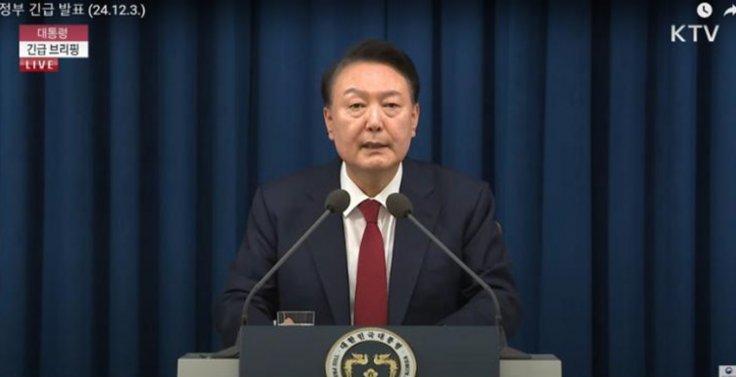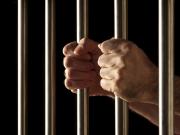
Investigators said on December 31 that a South Korean court has issued an arrest warrant for impeached and suspended President Yoon Suk Yeol in connection with his brief attempt to declare martial law in the nation.
Earlier in December, Yoon temporarily halted civilian government, causing South Korea to experience its worst political crisis in decades.
Parliament removed him from office due to the action, but the Constitutional Court has not yet decided whether to uphold the impeachment.
The Joint Investigation Headquarters said in a statement, "The arrest warrant and search warrant for President Yoon Suk Yeol, requested by the Joint Investigation Headquarters, were issued this morning."
The hardline leader may face life imprisonment or even death sentence if found guilty of insurrection.
On Monday, after the suspended president failed to appear for interrogation a third time, investigators looking into Yoon's proclamation of martial law obtained the warrant.
AFP reported on Tuesday that a Corruption Investigation Office official told reporters, "The reason for the warrant is that there is a concern that the individual may refuse to comply with summons without justifiable reasons, and there is sufficient probable cause to suspect the commission of a crime."
The official said, "The warrant is valid until Jan 6," adding that Yoon could be held at a police station or the Seoul detention centre.
The arrest warrant for the impeached President is "illegal and invalid," according to Yoon's attorney, who also stated that detectives were not authorized to question the President.
In a statement sent to AFP, Lawyer Yoon Kab-keun said, "The arrest warrant and search and seizure warrant issued at the request of an agency without investigative authority are illegal and invalid."
He said that his client had no intention of upsetting "the constitutional order" or staging "an uprising". The lawyer also added that his client was not guilty of insurrection.
Additionally, he said that the President's legal team would request a court order to nullify the warrant.
On Tuesday, investigators also stormed the army's Counter-intelligence Command offices and charged two senior commanders with mutiny and abuse of power.
By mid-afternoon on Tuesday, hundreds of people had gathered in front of the president's residence, mostly his supporters were waving South Korean flags and yelling slogans such as, "Martial law legal!" and "The impeachment is invalid".
Several police officers were dispatched to the scene, and they were observed yelling at demonstrators to move into line.
According to a representative of the biggest protest organization backing Yoon, "up to 3,000 people will move to protest against the unfair and invalid arrest warrant."
Although the warrant has been obtained, it is uncertain if police and detectives will be able to carry it out. Three search warrants have been previously denied by the presidential security service.
In a statement to local media on December 31, it stated, "Security measures regarding the execution of the warrant will be carried out in accordance with lawful procedures."
However, lawyer Yun Bok-nam, president of Lawyers for a Democratic Society, told AFP that though there was a legal basis for rejecting a search warrant, "there's no such provision for arrest warrants".
He said, "I expect the (arrest) process will proceed smoothly," adding that warrants were typically valid for seven days and had to be executed within that time frame.
Early on Dec 31, police were deployed outside Yoon's residence in central Seoul, in a likely bid to head off scuffles. Yoon's supporters and protesters calling for his removal have both staked out his residence, with local media running images of altercations between the two camps overnight.
"Up to 3,000 people will move to protest against the unfair and invalid arrest warrant," said an official from the largest protest group supporting Yoon.
Local media reported that an imminent arrest or search of the presidential residence was unlikely, as investigators would seek to coordinate with the presidential security service.
Technically, anyone obstructing the execution of an arrest warrant could be arrested.
Prosecutors and a combined team of police, Défense Ministry, and anti-corruption officers are looking into Yoon.
According to a 10-page prosecutors' report seen by AFP, during his unsuccessful attempt to impose martial law, Yoon gave the military permission to use force if necessary to enter Parliament.
"A one-sided account that neither corresponds to objective circumstances nor common sense," Yoon's attorney told AFP, dismissing the prosecutors' report earlier.
In an unexpected broadcast speech on December 3, Yoon proclaimed martial law with the goal of eradicating "anti-state elements." Within minutes of the announcement, lawmakers hurried to Parliament to reject it.
Heavy-armed soldiers simultaneously broke into the building, climbed fences, broke windows, and made a chopper landing.
The prosecution indictment report claims that Yoon informed Lieutenant-General Lee Jin-woo, the head of the Capital Defence Command, that military personnel could use firearms to infiltrate the National Assembly if needed.
According to the paper, there was proof that Yoon had been talking to high-ranking military officials about imposing martial law as early as March.
Late last week, South Korea's political unrest intensified when Parliament impeached Han Duck-soo, Yoon's replacement, for not approving bills for Yoon's inquiry.
As the new acting president, Finance Minister Choi Sang-mok was thrown headfirst into a catastrophe when the Jeju Air plane crashed on December 29 and 179 people were killed.









